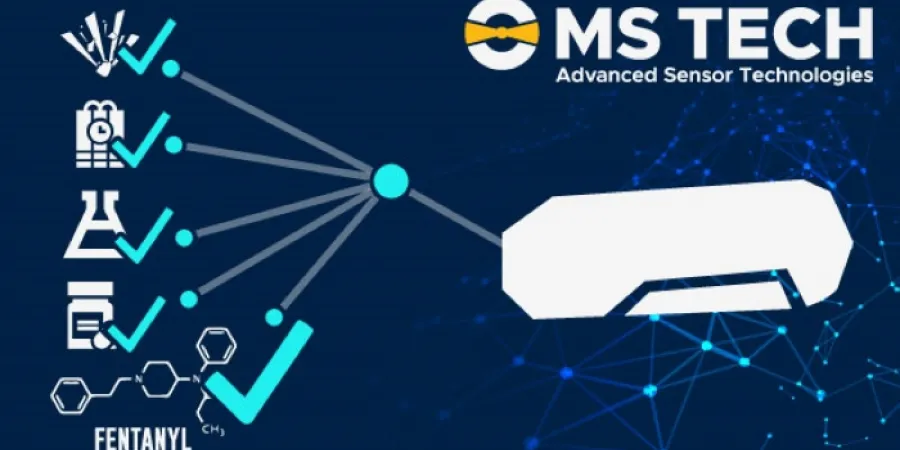MS Tech expands capabilities of its sensors to detect narcotics, explosives
The capabilities reportedly enable defense forces, homeland security agencies and first responders to detect such dangerous threats within seconds
Eyal Boguslavsky
| 01/12/2020
MS Tech, an Israeli developer, manufacturer, and innovator of nanotechnology, IoT and big-data sensors, announced Monday that its homeland security and defense division has expanded its detection capabilities covering chlorates, perchlorates, fentanyl and a range of synthetic opioids to meet with current growing threats around the world. According to the company, the latest capabilities enable defense forces, homeland security agencies and first responders to detect and identify dangerous chemical threats within seconds.
Fentanyl is a powerful synthetic drug similar, yet much more potent, to morphine and heroin. Law enforcement and first responders have a high risk in being exposed with such drugs, unknowingly, from its many forms, and any breathing or direct contact exposure can be deadly and lethal. Chlorates and Perchlorates are very powerful oxidizers and were used in homemade explosives in past terror attacks.
Doron Shalom, CEO of MS Tech said, "The detection of these emerging and global threats is extremely difficult with the traditional analytical methods commonly used today; following an extensive R&D process, our innovating HF-QCM nanotechnology sensors, enhanced engineering and smart detection algorithms are now able to detect and identify these threats. We expect that these expanded capabilities will be soon adopted by a range of EOD units, police, law enforcement and first responders across the globe."
MS Tech’s flagship products are the EXPLOSCAN, DUOSCAN and LIQUISCAN. The EXPLOSCAN and DUOSCAN are explosive and narcotics trace and vapors detectors, and the LIQUISCAN is a liquid explosives detector that uses the High-Frequency Quartz Crystal Microbalance "HF-QCM" nanotechnology sensors developed, manufactured and patented by MS Tech. According to the company, the products feature an innovative design with self-calibrating and self-cleaning capabilities, with the highest levels of operational availability, while the HF-QCM sensors are non-radioactive, providing a completely green and safe working environment.
The company claims that the EXPLOSCAN, DUOSCAN and LIQUISCAN are ideal for aviation and transportation security, high-threat facilities and infrastructures, military, customs and border control, mail inspection and cargo screening markets. The systems are said to be operationally proven in in a wide spectrum of temperatures, withstanding even the harshest environmental conditions including dust and humidity.
The capabilities reportedly enable defense forces, homeland security agencies and first responders to detect such dangerous threats within seconds
MS Tech, an Israeli developer, manufacturer, and innovator of nanotechnology, IoT and big-data sensors, announced Monday that its homeland security and defense division has expanded its detection capabilities covering chlorates, perchlorates, fentanyl and a range of synthetic opioids to meet with current growing threats around the world. According to the company, the latest capabilities enable defense forces, homeland security agencies and first responders to detect and identify dangerous chemical threats within seconds.
Fentanyl is a powerful synthetic drug similar, yet much more potent, to morphine and heroin. Law enforcement and first responders have a high risk in being exposed with such drugs, unknowingly, from its many forms, and any breathing or direct contact exposure can be deadly and lethal. Chlorates and Perchlorates are very powerful oxidizers and were used in homemade explosives in past terror attacks.
Doron Shalom, CEO of MS Tech said, "The detection of these emerging and global threats is extremely difficult with the traditional analytical methods commonly used today; following an extensive R&D process, our innovating HF-QCM nanotechnology sensors, enhanced engineering and smart detection algorithms are now able to detect and identify these threats. We expect that these expanded capabilities will be soon adopted by a range of EOD units, police, law enforcement and first responders across the globe."
MS Tech’s flagship products are the EXPLOSCAN, DUOSCAN and LIQUISCAN. The EXPLOSCAN and DUOSCAN are explosive and narcotics trace and vapors detectors, and the LIQUISCAN is a liquid explosives detector that uses the High-Frequency Quartz Crystal Microbalance "HF-QCM" nanotechnology sensors developed, manufactured and patented by MS Tech. According to the company, the products feature an innovative design with self-calibrating and self-cleaning capabilities, with the highest levels of operational availability, while the HF-QCM sensors are non-radioactive, providing a completely green and safe working environment.
The company claims that the EXPLOSCAN, DUOSCAN and LIQUISCAN are ideal for aviation and transportation security, high-threat facilities and infrastructures, military, customs and border control, mail inspection and cargo screening markets. The systems are said to be operationally proven in in a wide spectrum of temperatures, withstanding even the harshest environmental conditions including dust and humidity.



